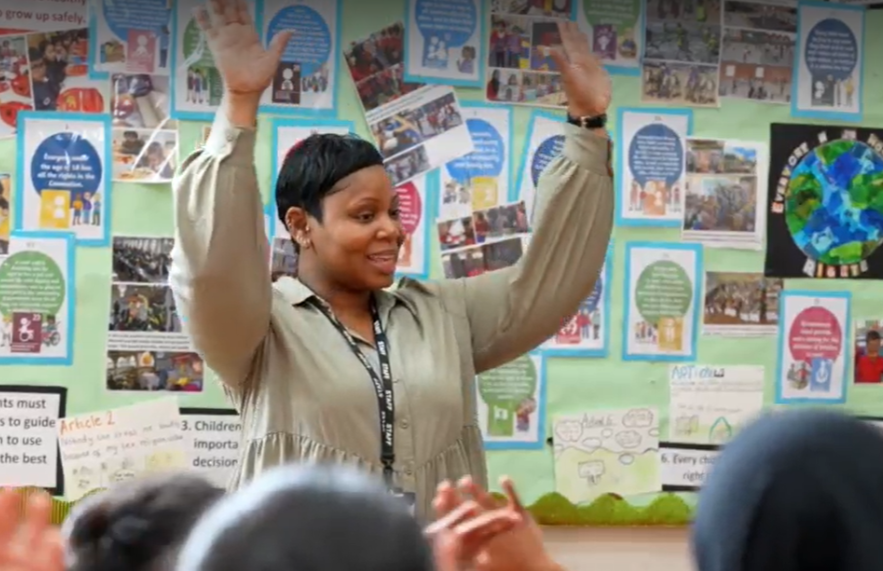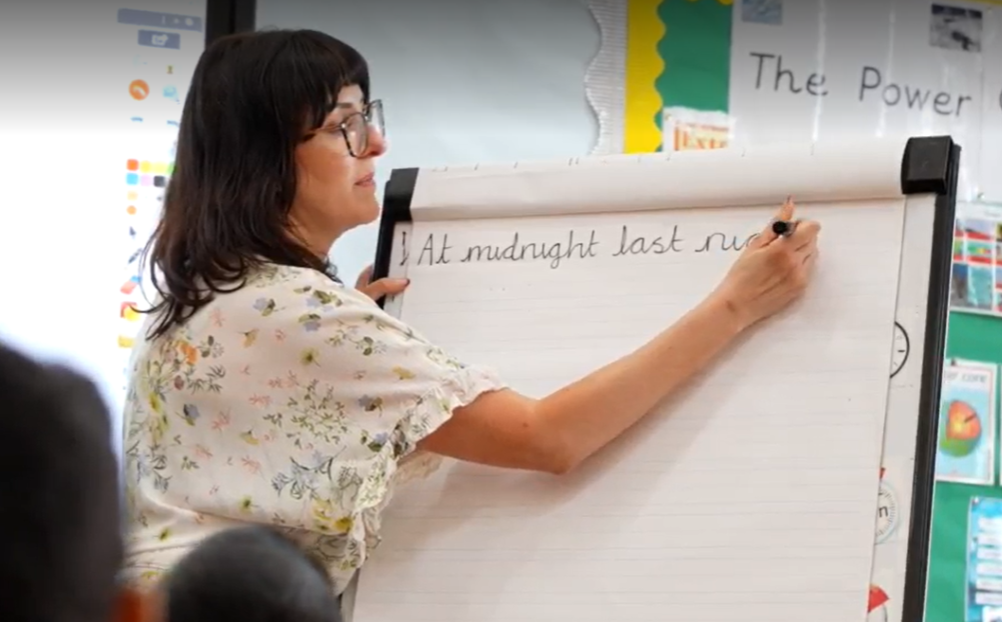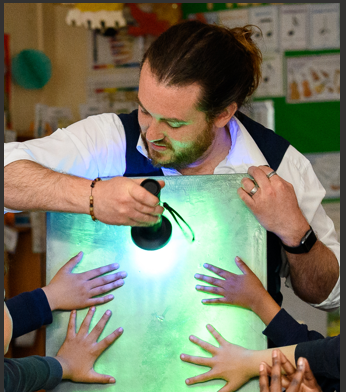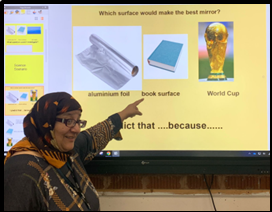Talk for Writing training centre

Yew Tree Community School is a Talk for Writing training centre.
See attachment below for 2024 training opportunities.
Yew Tree Community Junior and Infant School is currently one of two schools within Inspire Education Community Trust. Both schools are ‘Good’ schools. Yew Tree has been using Talk for Writing as its strategy for writing since 2015: it is securely embedded across the school. We strongly believe children become better writers when they first become confident speakers. By using talk as a foundation, Talk for Writing helps our pupils improve their vocabulary, grammar, sentence structure and overall writing skills.
At our school, 45% of pupils are eligible for free school meals and 95% have English as an additional language. The school’s location is within an area of high deprivation; however, our families (and the commitment they make to their children’s learning) are a strength to our school.
Talk for Writing is at the heart of what we do, and it underpins, writing, reading and language development, plus enhancing the wider curriculum (Science see below). It has been strategically thought through and taught systematically and effectively across the school from Nursery to Year 6. Our teachers love teaching it and our children love using it.
 One of the main reasons why we use Talk for Writing is its impact on children's language development. It helps pupils internalise the language patterns, vocabulary and sentence structures associated with a specific genre or topic. This aids in the development of our pupils’ ideas and gives them a strong linguistic foundation to draw upon when it comes time to write.
One of the main reasons why we use Talk for Writing is its impact on children's language development. It helps pupils internalise the language patterns, vocabulary and sentence structures associated with a specific genre or topic. This aids in the development of our pupils’ ideas and gives them a strong linguistic foundation to draw upon when it comes time to write.
Another benefit is the way Talk for Writing fosters creativity and imagination. By providing opportunities for our pupils to explore ideas orally and share their thoughts with others, the approach encourages divergent thinking and imaginative expression. Pupils collaboratively generate ideas, develop storylines and experiment with language, leading to more original and compelling writing pieces.
 Furthermore, Talk for Writing supports the development of grammar skills. Through carefully structured activities and discussions, our pupils are able to identify and understand specific grammatical features within texts. They can analyse the impact of different sentence structures, explore different grammatical choices, and apply these techniques in their own writing. This deep understanding of grammar leads to more sophisticated and accurate writing.
Furthermore, Talk for Writing supports the development of grammar skills. Through carefully structured activities and discussions, our pupils are able to identify and understand specific grammatical features within texts. They can analyse the impact of different sentence structures, explore different grammatical choices, and apply these techniques in their own writing. This deep understanding of grammar leads to more sophisticated and accurate writing.
Finally, Talk for Writing promotes a sense of ownership and engagement in the writing process. Pupils become active participants and co-creators, as they can discuss, plan and develop their ideas collaboratively. This involvement fosters a sense of ownership and personal investment in the writing, ultimately leading to increased motivation and improved outcomes.
Through Talk for Writing, pupils become confident and skilled writers, equipped with the necessary tools to express themselves effectively. However, Talk for Writing doesn’t just impact writing, it supports children to articulate their deepened understanding of learning across the curriculum.
Talk in Science
Talk in Science is an approach that teaches pupils to think and talk like a scientist. It is embedded into the curriculum of the school, which is language-rich, exciting and practical. Difficult concepts and core knowledge are broken down into accessible steps by answering core questions that are presented to the learners. Children unlock the core knowledge through a range of adaptive methods and put the knowledge into context through a range of methods. The Science Action Dictionary teaches key vocabulary for a given module using drama and utilising actions that relate to the word’s definition. The vocabulary is used in context and frequently revisited to ensure that terms are embedded from a child’s working memory into their long-term memory. Core knowledge is revisited throughout a child’s time within the school, through the design of the curriculum and the application of review quizzes, where past learning, including learning from preceding years is reviewed.

‘Science Scenarios’ utilise previous knowledge and the processes of ‘Working Scientifically’ in a non-threatening way, which provide children with an opportunity to apply their knowledge within a mini, hypothetical investigation. Children will be given a fictitious scenario and asked to apply their knowledge and make a prediction about the outcome. The fictitious results are then shared and the children will collectively draw a conclusion.
‘Enquiry Games’ are used to support a child’s understanding of ‘working scientifically’. The games are age appropriate and are linked to the outcomes of the National Curriculum for Science, specifically ‘working scientifically’. Children develop their understanding of the different methodologies through a range of quick paced activities that require pupils to develop and apply their understanding of ‘working scientifically’ to a given hypothetical investigation. 
In summary, our results in writing and reading have never faltered since becoming a Talk for Writing school. The consistency across the school allows our pupils to be successful regardless of their starting point. Pupils continuously build on previous learning, developing greater independence each time.
What will you see when you visit our school?
-
Engaging Classroom Environments
Classrooms that are clutter-free and allow pupils to focus on their learning. All of our classrooms have a ‘washing line’ which gets added to throughout the unit.
-
Storytelling and Imitation using Text Maps
With a strong emphasis on oral language development, you may observe teachers acting out stories, students retelling texts using a text map or other drama activities and games.
-
Creative Planning
Pupils planning using a box-it up grid whilst also incorporating their toolkits. Pupils focus on both language and structural features.
-
Shared Writing and Short Bursts
Teachers modelling techniques to demonstrate the writing process. Both pupils and the teacher collaboratively compose texts, always discussing author choices.
-
Language Games and Activities
Every writing lesson contains a word/language game to embed learning (language, grammar or sentence structure) whilst keeping the lesson enjoyable and interactive.
-
Immersive Reading.
Every classroom has a book corner, and we have a strong Reading for Pleasure routine (which is how we start the day at our school). Read Aloud is also timetabled daily.
-
Skilled Practitioners
A range of Talk for Writing strategies being taught by skilled trainers and ECTs across the school.
-
Pupil voice
Time to talk to children and hear them articulate good understanding of the strategies of Talk for Writing.
-
Strong Collaboration and Paired Work
Opportunity to share ideas and good practice.
-
Progression of Skills
-
Variety of Assessment and Feedback
Please click on the link below for more information.
